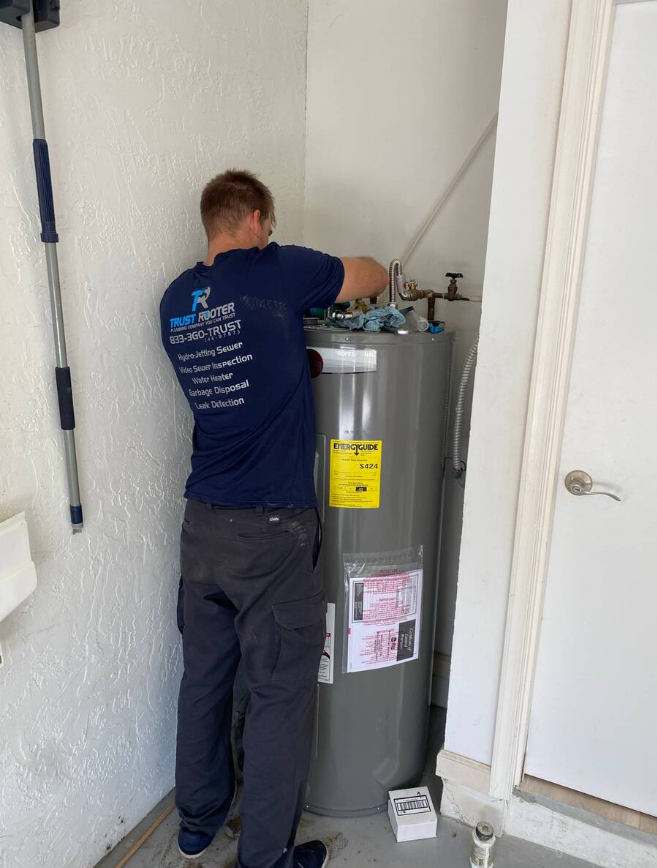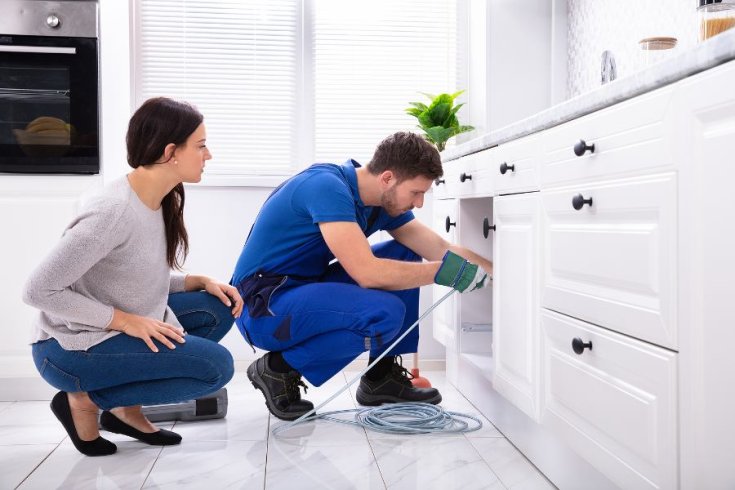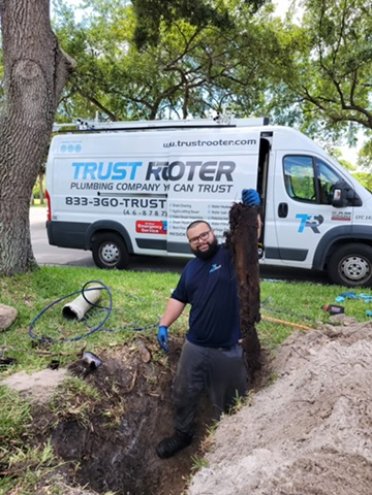As you consider the condition of your current water heater, you may be wondering when it's time for a water heater replacement. You should be aware of the signs that indicate your water heater is failing to avoid unexpected disruptions to your daily routine. By knowing what to look for, you can take proactive steps to replace your water heater before it fails, ensuring you have a steady supply of hot water when you need it.
Key Takeaways:
-
Look out for signs such as rust-colored water and inconsistent hot water to determine if your water heater is failing.
-
Consider the type of water heater you need, choosing between tank and tankless options, and think about the size and efficiency that suits your household.
-
Hiring a professional for water heater replacement can provide warranty protection and ensure safe installations.
-
A professional can help you choose the right size and type of water heater for your needs, ensuring you get the most efficient system.
-
Regular maintenance and inspections can help extend the life of your water heater, but knowing when to replace it is key to avoiding unexpected failures.
Trust Rooter Plumbing & Drain Cleaning 10752 La Placida Dr #8-A1, Coral Springs, FL 33065, United States
Signs Your Water Heater Needs Replacement
Your water heater is a vital component of your home's plumbing system, and its failure can cause significant inconvenience. You should be aware of the signs that indicate your water heater needs replacement to avoid unexpected breakdowns. One of the key factors to consider is the age of your water heater. Most water heaters have a lifespan of around 10 to 15 years, depending on the type and usage. If your water heater is approaching or has exceeded this age, it may be nearing the end of its service life.
As you consider replacing your water heater, you can explore options for water heater replacement to find the best solution for your needs. You should also inspect your water heater regularly for signs of wear and tear, such as rust, corrosion, or leaks. These signs can indicate that your water heater is failing and needs to be replaced soon.
Age of the Water Heater
If you're not sure how old your water heater is, you can check the serial number on the manufacturer's label. The serial number usually contains a date code that indicates the month and year of manufacture. You can use this information to determine the age of your water heater and decide if it's time to replace it. For example, if your water heater is over 12 years old, it may be nearing the end of its service life, and you should start considering replacement options.
Additionally, you should consider the type of water heater you have. Tankless water heaters, for instance, can last up to 20 years or more, while traditional tank-style water heaters typically last between 10 to 15 years. Understanding the type and age of your water heater will help you make informed decisions about when to replace it.
Rust and Corrosion
Rust and corrosion are common signs that your water heater is failing. You may notice rust-colored water coming out of your faucets or see corrosion on the water heater's tank or pipes. These signs indicate that the water heater's protective lining has broken down, allowing rust and corrosion to form. If you notice any of these signs, you should consider replacing your water heater as soon as possible to avoid further damage.
Rust and corrosion can cause significant damage to your water heater and plumbing system. For example, if the corrosion is severe, it can cause the water heater's tank to rupture, leading to costly repairs and potential water damage. By replacing your water heater at the first sign of rust or corrosion, you can avoid these costly repairs and ensure your plumbing system continues to function properly.
Furthermore, rust and corrosion can also affect the quality of your water. If you notice rust-colored water coming out of your faucets, it may be a sign that the corrosion has contaminated your water supply. In this case, replacing your water heater is not only necessary to prevent further damage but also to ensure the quality and safety of your water.
Unusual Noises
Unusual noises coming from your water heater can also indicate that it's failing. You may hear banging, clanking, or whining sounds, which can be caused by a variety of factors, including sediment buildup, loose pipes, or a failing heating element. If you notice any unusual noises, you should investigate the cause and consider replacing your water heater if necessary.
For example, if you hear a banging or clanking sound, it may be caused by sediment buildup in the water heater's tank. This can be a sign that the water heater is nearing the end of its service life, and you should consider replacing it soon. On the other hand, if you hear a whining sound, it may be caused by a failing heating element, which can be replaced to extend the life of your water heater.
In addition to these signs, you should also be aware of any changes in your water heater's performance. If you notice that it's taking longer to heat water or that the water temperature is inconsistent, it may be a sign that the water heater is failing. By being aware of these signs and taking prompt action, you can avoid unexpected breakdowns and ensure your plumbing system continues to function properly.
Water Leaks
Water leaks are another common sign that your water heater is failing. You may notice water leaking from the tank, pipes, or valves, which can cause significant damage to your home and plumbing system. If you notice any water leaks, you should turn off the water supply to the water heater and consider replacing it as soon as possible.
Water leaks can be caused by a variety of factors, including corrosion, loose connections, or a faulty temperature and pressure relief valve. If you notice a leak, you should investigate the cause and take prompt action to prevent further damage. For example, if the leak is caused by corrosion, you may need to replace the water heater's tank or pipes. On the other hand, if the leak is caused by a loose connection, you may be able to repair it by tightening the connection.
By being aware of these signs and taking prompt action, you can avoid unexpected breakdowns and ensure your plumbing system continues to function properly. If you're unsure about any aspect of your water heater's performance or condition, you can consult a professional plumber in Cooper City, FL for advice and guidance. Trust Rooter Plumbing & Drain Cleaning, 10752 La Placida Dr #8-A1, Coral Springs, FL 33065, United States, can provide you with expert advice and services for your water heater replacement needs.
Hot Water Supply Issues
As you continue to use your water heater, you may start to notice issues with your hot water supply. One common problem is inconsistent temperature, which can be frustrating and uncomfortable. You may find that your water is too hot or too cold, or that it fluctuates between the two. This can be due to a variety of factors, including a malfunctioning thermostat or a buildup of sediment in the tank.
To better understand the causes of inconsistent temperature, consider the following table:
| Cause | Effect |
| Malfunctioning thermostat | Inconsistent temperature readings |
| Sediment buildup in the tank | Reduced heat transfer and inconsistent temperature |
Inconsistent Temperature
You may notice that your water temperature is inconsistent, which can be a sign that your water heater is on its way out. This can be due to a variety of factors, including a malfunctioning thermostat or a buildup of sediment in the tank. As you consider water heater replacement, think about the importance of a consistent temperature in your daily life. You use hot water for everything from showering to washing dishes, and inconsistent temperature can make these tasks uncomfortable and inconvenient.
In addition to inconsistent temperature, you may also notice that your water heater is producing less hot water than it used to. This can be a sign that the heater is losing its efficiency, and it may be time to consider replacement. You can start by checking the temperature setting on your water heater to ensure it is set correctly, and then consider having a professional inspect the unit to determine the cause of the problem.
Reduced Water Pressure
Another common issue with water heaters is reduced water pressure. You may notice that your water pressure is lower than it used to be, which can make it difficult to perform everyday tasks like washing dishes or taking a shower. This can be due to a variety of factors, including a buildup of sediment in the tank or a malfunctioning pressure regulator. As you consider water heater replacement, think about the importance of adequate water pressure in your daily life. You rely on your water heater to provide enough hot water to meet your needs, and reduced water pressure can make it difficult to do so.
Reduced water pressure can also be a sign of a more serious issue with your water heater. For example, if the pressure regulator is malfunctioning, it can cause the tank to over-pressurize, which can lead to a rupture or other safety issues. By addressing reduced water pressure promptly, you can help prevent more serious problems from developing and ensure that your water heater continues to function safely and efficiently. Trust Rooter Plumbing & Drain Cleaning 10752 La Placida Dr #8-A1, Coral Springs, FL 33065, United States.
Types of Water Heaters
As you consider your options for a new water heater, you'll want to think about the different types available to you. You can choose from conventional tank water heaters, tankless water heaters, and more. Some key factors to consider when selecting a water heater include energy efficiency, cost, and space requirements. Here are some key characteristics of different types of water heaters:
Thou can use the following table to compare the key features of different types of water heaters:
| Type of Water Heater | Key Features |
| Conventional Tank | Lower upfront cost, simple installation |
| Tankless | Higher energy efficiency, longer lifespan |
| Heat Pump | High energy efficiency, environmentally friendly |
| Solar | Renewable energy source, low operating costs |
| Indirect | Uses home's heating system, high energy efficiency |
Conventional Tank Water Heaters
Conventional tank water heaters are the most common type of water heater. They store hot water in a tank, which is heated by an element at the bottom of the tank. You can choose from a variety of tank sizes, ranging from 20 to 80 gallons. Conventional tank water heaters are relatively inexpensive to purchase and install, but they can be less energy-efficient than other types of water heaters. They also require regular maintenance to ensure they continue to function properly.
Tankless Water Heaters
Tankless water heaters, on the other hand, heat water on demand. They do not store hot water in a tank, but instead use a heating element to warm the water as it flows through the unit. Tankless water heaters are more energy-efficient than conventional tank water heaters and can provide a continuous supply of hot water. They are also more compact and can be installed in smaller spaces. However, they can be more expensive to purchase and install, and may require more complex maintenance.
Tankless water heaters are a good option for you if you want to save energy and have a continuous supply of hot water. They are also a good choice if you have limited space, as they are more compact than conventional tank water heaters. Thou can consider the pros and cons of tankless water heaters and decide if they are the right choice for your needs. For more information on water heater replacement, visit water heater replacement page. Trust Rooter Plumbing & Drain Cleaning 10752 La Placida Dr #8-A1, Coral Springs, FL 33065, United States.
Factors to Consider When Replacing
As you prepare for a water heater replacement, several factors come into play to ensure you get the right unit for your needs. You'll want to consider the type of water heater, its energy efficiency, and its capacity to meet your household's demands. Some key factors to consider include:
-
Energy efficiency ratings
-
Cost of the unit and installation
-
Space constraints and venting requirements
Perceiving these factors will help you make an informed decision when selecting a new water heater.
Energy Efficiency
Your new water heater's energy efficiency can significantly impact your utility bills and environmental footprint. You'll want to look for a unit with a high Energy Factor (EF) rating, which measures the water heater's efficiency based on its recovery efficiency, standby losses, and cycling losses. For example, a water heater with an EF rating of 0.90 or higher is considered energy-efficient. Additionally, you may want to consider a water heater with advanced features such as temperature and pressure relief valves, or a unit that uses alternative energy sources like solar or heat pump technology.
Capacity and Size
The capacity and size of your new water heater will depend on your household's hot water usage patterns. You'll want to consider the number of people in your household, your average hot water usage, and the flow rate of your faucets and appliances. A general rule of thumb is to choose a water heater with a capacity that can meet your peak hot water demand, usually during morning and evening hours. For instance, a family of four may require a water heater with a capacity of at least 50 gallons.
Considering the capacity and size of your water heater is vital to ensure you have a steady supply of hot water. You'll also want to consider the physical space where the water heater will be installed, taking into account the unit's dimensions, weight, and venting requirements. This will help you avoid any installation issues and ensure a smooth water heater replacement process. Perceiving the right balance between capacity, size, and energy efficiency will help you choose the perfect water heater for your home. Trust Rooter Plumbing & Drain Cleaning 10752 La Placida Dr #8-A1, Coral Springs, FL 33065, United States.
DIY vs. Professional Installation
As you consider replacing your water heater, you're likely weighing the pros and cons of tackling the job yourself versus hiring a professional. Your decision will depend on your level of comfort with complex plumbing projects and your willingness to take on the risks associated with DIY installations. If you're not experienced with plumbing, a professional installation is likely your best bet, as it will ensure your new water heater is installed correctly and functions safely. You can hire a professional for water heater replacement to get the job done efficiently.
Your safety and the safety of your family should be your top priority, and a professional installation will give you peace of mind. A licensed plumber will have the necessary training and experience to install your new water heater quickly and correctly, and they'll be able to handle any unexpected issues that may arise during the installation process. Additionally, a professional installation will ensure that your new water heater is properly vented and connected to your home's plumbing system, which will help prevent accidents and ensure your new water heater functions efficiently.
Benefits of Professional Help
One of the primary benefits of hiring a professional to install your new water heater is the warranty protection they offer. When you hire a licensed plumber, you can rest assured that your new water heater will be installed correctly, and you'll be protected in case anything goes wrong. Most plumbers offer a warranty on their work, which means you'll be covered if your new water heater fails or doesn't function properly due to an installation issue. This can save you a significant amount of money in the long run, as you won't have to pay for costly repairs or replacements.
Another benefit of professional help is the safe installations they provide. A licensed plumber will have the necessary training and experience to install your new water heater safely, which will help prevent accidents and ensure your new water heater functions efficiently. They'll be able to handle any unexpected issues that may arise during the installation process, and they'll ensure that your new water heater is properly vented and connected to your home's plumbing system. This will give you peace of mind, as you'll know your new water heater is installed correctly and safely.
Cost Considerations
The cost of hiring a professional to install your new water heater will depend on a variety of factors, including the type and size of your new water heater, the complexity of the installation, and the plumber's labor rates. On average, you can expect to pay between $500 and $2,000 for a professional installation, although this cost can vary depending on your location and the specifics of your project. While this may seem like a significant expense, it's a small price to pay for the peace of mind that comes with knowing your new water heater is installed correctly and safely.
For example, if you're installing a tankless water heater, the cost of the installation will likely be higher than if you were installing a traditional tank-style water heater. This is because tankless water heaters require more complex plumbing and electrical connections, which can increase the labor costs associated with the installation. However, the long-term savings you'll realize with a tankless water heater can make the higher upfront cost worth it, as these units are typically more energy-efficient and can last longer than traditional tank-style water heaters.
In addition to the initial cost of the installation, you should also consider the long-term cost savings you'll realize with a professional installation. A correctly installed water heater will function more efficiently, which can help lower your energy bills and save you money over time. Additionally, a professional installation will help extend the life of your new water heater, which can save you money on replacement costs down the road. By hiring a professional to install your new water heater, you can ensure your new unit is installed correctly and safely, and you can enjoy the long-term cost savings that come with a professional installation. Trust Rooter Plumbing & Drain Cleaning, 10752 La Placida Dr #8-A1, Coral Springs, FL 33065, United States.
Maintenance Tips for New Water Heaters
Now that you've invested in a new water heater, you want to ensure it lasts as long as possible. To do this, you should perform regular maintenance tasks to prevent issues before they arise. Your new water heater requires attention to detail, and by following these tips, you can extend its lifespan and avoid premature water heater replacement. Some key maintenance tasks include:
This will help you identify potential problems early on and take corrective action to prevent them from becoming major issues.
Regular Inspections
You should inspect your water heater regularly to catch any potential problems before they become major issues. Start by checking the temperature and pressure relief valve to ensure it's working properly. You should also inspect the anode rod, which helps protect the water heater from corrosion. If you notice any signs of wear or damage, you should replace the anode rod to prevent further damage. By performing these regular inspections, you can help extend the life of your water heater and prevent costly repairs down the line.
Flushing the System
Flushing the system is another important maintenance task that can help extend the life of your water heater. Over time, sediment and debris can build up in the tank, reducing its efficiency and potentially causing damage. By flushing the system, you can remove this sediment and debris, helping to maintain your water heater's performance and prevent premature failure. You should flush your water heater at least once a year, depending on usage and manufacturer recommendations.
Flushing the system involves draining the tank and refilling it with fresh water. You should start by turning off the power to the water heater and letting it cool down. Then, you can attach a hose to the drain valve and direct it to a drain or bucket. Once the tank is empty, you can refill it with fresh water and turn the power back on. This process can help remove sediment and debris, improving your water heater's efficiency and performance. This will help you get the most out of your new water heater and avoid unnecessary repairs or even water heater replacement. Trust Rooter Plumbing & Drain Cleaning 10752 La Placida Dr #8-A1, Coral Springs, FL 33065, United States.
To wrap up
Upon reflecting on the signs that indicate your water heater is nearing its end, you can take proactive steps to avoid unexpected failures. You've learned to identify rust-colored water, inconsistent hot water, and other indicators that signal it's time for a water heater replacement. By recognizing these signs, you can plan ahead and make informed decisions about your new water heater, considering factors such as tank vs. tankless, size, and efficiency. This knowledge will empower you to make the best choice for your specific needs and budget.
As you move forward with your water heater replacement, you should consider hiring a professional to ensure a safe and efficient installation. This will not only provide you with warranty protection but also give you peace of mind knowing that the job is done correctly. By taking these steps, you'll be able to enjoy reliable and consistent hot water in your home. For all your plumbing needs, including water heater replacement, trust the experts at Trust Rooter Plumbing & Drain Cleaning, located at 10752 La Placida Dr #8-A1, Coral Springs, FL 33065, United States
Signs Your Water Heater Is on Its Way Out
Q: What are the signs that indicate my water heater is failing and needs a water heater replacement?
A: There are several signs that indicate your water heater is on its way out, including rust-colored water, inconsistent hot water, and strange noises. If you notice any of these signs, it's vital to consider a water heater replacement before it fails completely.
Q: What does it mean when I see rust-colored water coming out of my faucets, and how does it relate to my water heater?
A: Rust-colored water is a sign that your water heater is corroding from the inside out. This can be due to a buildup of sediment, old age, or a faulty anode rod. If you notice rust-colored water, it's a good idea to consider a water heater replacement to avoid any further damage or health risks.
Q: What are the differences between tank and tankless water heaters, and which one is right for me?
A: Tank water heaters store hot water in a tank, while tankless water heaters heat water on demand. Tankless water heaters are more energy-efficient and take up less space, but they can be more expensive to install. When considering a water heater replacement, it's vital to weigh the pros and cons of each type and choose the one that best fits your needs and budget.
Q: Why is it important to consider the size and efficiency of my new water heater when replacing my old one?
A: Choosing the right size and efficiency of water heater is vital to ensure you have enough hot water for your needs while also saving energy and money. A water heater that is too small may not provide enough hot water, while one that is too large can be wasteful. When deciding on a new water heater for your water heater replacement, consider factors such as your household size, water usage, and energy efficiency to make an informed decision.
Q: Why should I hire a professional for my water heater replacement instead of attempting to do it myself?
A: Hiring a professional for your water heater replacement ensures a safe and correct installation, which is vital for warranty protection and to avoid any potential hazards. A professional plumber can also help you choose the right water heater for your needs and ensure that it is installed correctly to provide you with years of reliable service.



 Jun 27,2025
Jun 27,2025


